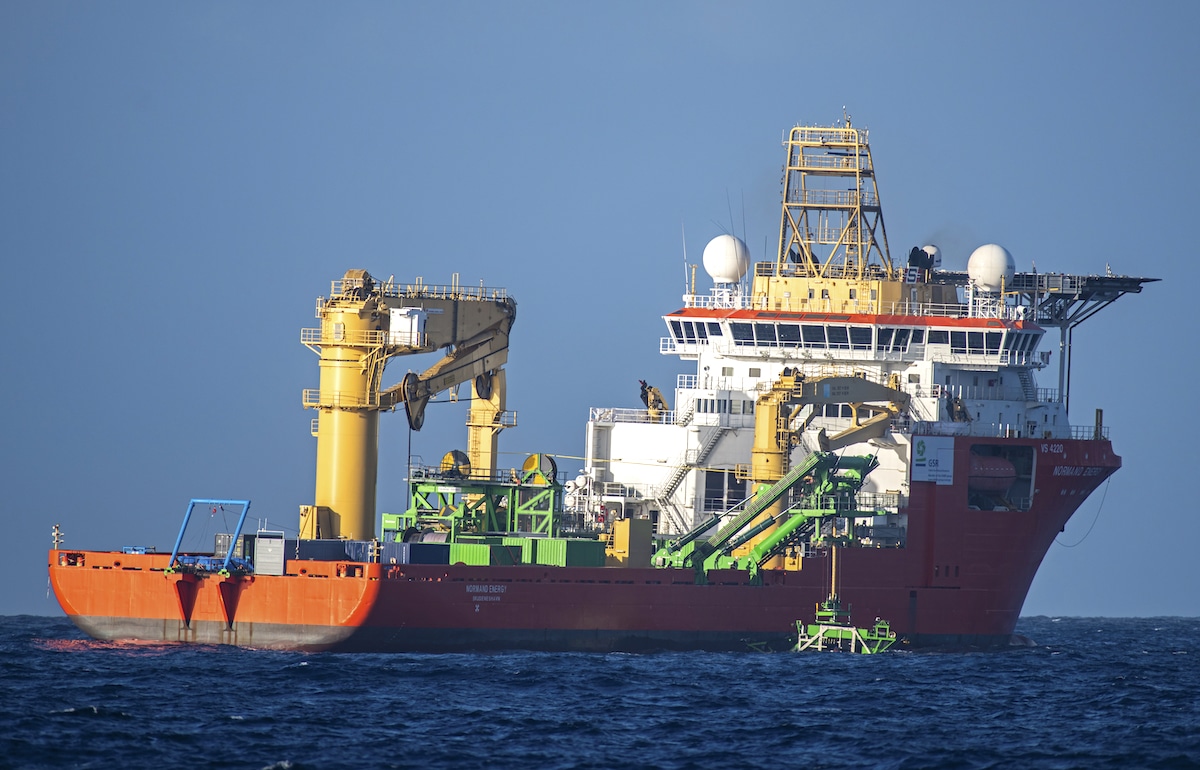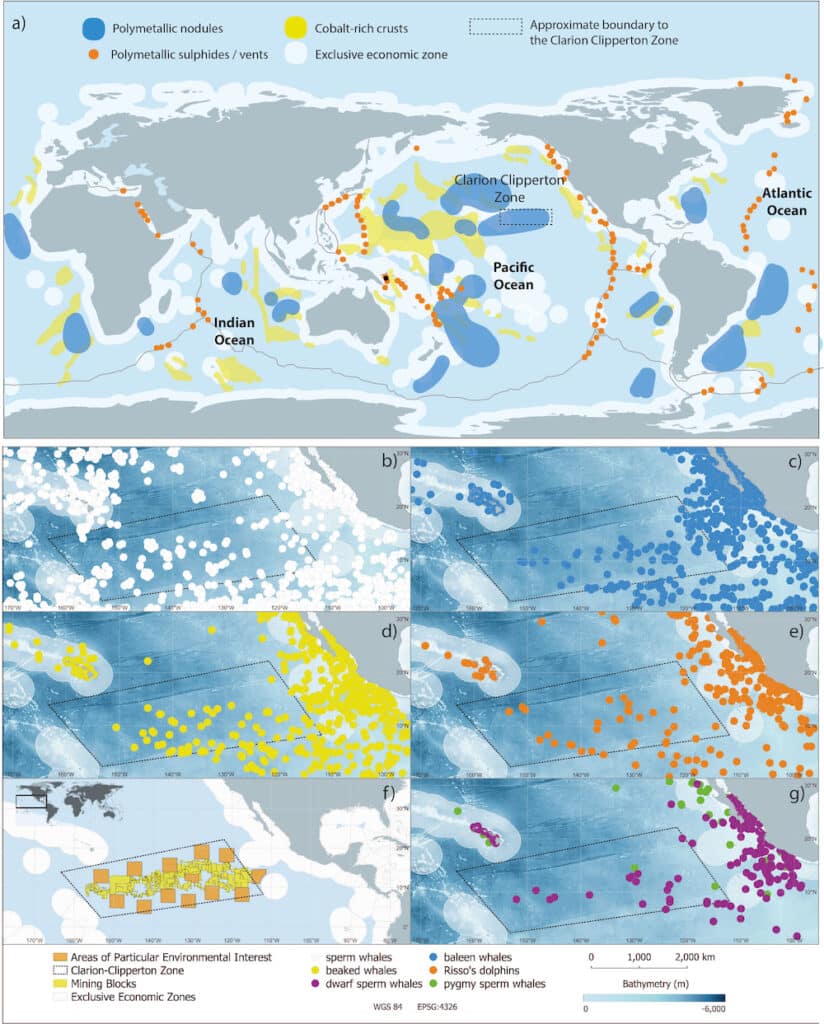Deep-Sea Mining Could Harm Whales and Dolphins, Too

 Why you can trust us
Why you can trust us
Founded in 2005 as an Ohio-based environmental newspaper, EcoWatch is a digital platform dedicated to publishing quality, science-based content on environmental issues, causes, and solutions.
Blue whales are the largest animals on Earth, but that didn’t save them when commercial whaling wiped out as much as 97 percent of their numbers. Today, the aquatic giants are still considered Endangered by the International Union for Conservation of Nature Red List, and while their numbers are increasing, they still face threats including vessel strikes and the climate crisis. Now, a new threat may be looming on the horizon: deep-sea mining.
Blue whales are one of the 22 to 30 species of cetaceans — the order that includes whales, dolphins and porpoises — that have been documented in the Clarion Clipperton Zone (CCZ), a region in the Pacific Ocean where testing for deep-sea mining has already begun. That’s one of the findings from a Greenpeace Research Laboratories and University of Exeter led study published in Frontiers in Marine Science this month, which researchers believe is the first to look at how deep-sea mining might impact cetaceans.
“Our primary finding is we don’t know how important these habitats are for these species, we don’t know which species are really using them. And then also, [on] the flip side, we don’t know so much about what the effects of mining might be in future,” study co-author and lecturer in ecology at the University of Exeter Dr. Kirsten Thompson told EcoWatch in an interview.
The Precautionary Principle
The new paper is the fourth in a series of studies Thompson has helped author that turn a critical look at deep-sea mining, the term for removing mineral deposits from the ocean floor below around 656 feet. The first two, published in 2018, focused on impacts to little understood deep-sea ecosystems and difficulties with governing the process. The third, published in 2021, challenged the notion that mining the seabed is necessary to secure enough of certain types of metals and minerals required for the renewable energy transition. Most of the environmental work on deep-sea mining to date has focused on the “irreversible damage” it could do to vulnerable seafloor ecosystems, but the new paper suggests that larger and more mobile marine animals like whales and dolphins are unlikely to remain unscathed.
“Here’s another species group that is facing a huge number of stresses from other human activities and other changes to the oceans and has also, for some species, still not recovered from centuries of exploitation,” Thompson said.
While marine mammals in general are better studied than deep-sea biodiversity — only around a fifth of marine species have even been described by scientists — those studies typically occur close to shore or to islands. There is much that researchers don’t know about how cetaceans interact with the open ocean areas that would be the focus of mining. The CCZ, for example, is an approximately 11,650,000 square kilometer (4,498,090 square mile) stretch of ocean between Mexico and Hawaii with an average depth of 5,500 meters (approximately 18,045 feet), where 17 exploratory mining licenses have already been granted. Using data from the Ocean Biodiversity Information System-Spatial Ecological Analysis of Megavertebrate Population (OBIS-Seamaps), the researchers were able to map where cetacean sightings overlapped with the CCZ. They found that it provided habitat for several species including blue whales, humpback whales, sperm whales, minke whales, beaked whales, Risso’s dolphins and dwarf and pygmy sperm whales.

“Although more survey data are needed to determine temporal and spatial use of the CCZ by cetaceans, available data clearly confirm the presence of the aforementioned species in the region,” the study authors wrote.
How might deep-sea mining in the CCZ harm the whales and dolphins that pass through?
“I think primarily something that sticks out is that it’s an industry that’s likely to emit quite a lot of noise, and for certain species that is a real problem,” Thompson said.
Mining would likely persist 24-hours a day at frequencies that could make it harder for whales to communicate and therefore lead to changes in their behavior. For example, one study found that existing underwater noise increased the risk that mother humpback whales would become separated from their calves because the human-caused noise would drown out the whales’ calls.
While there are many uncertainties about exactly what frequencies deep-sea mining would emit, Thompson argued that decision makers should approach deep-sea mining from the precautionary principle that potential harms should be avoided.
‘It shouldn’t have any commercial reality at all given how little we know,” Thompson said.
Ticking Clock
Thompson’s concern is one shared by many scientists. She is one of 704 marine science and policy experts who has signed a call for a global moratorium on deep-sea mining until its environmental impacts can be truly assessed and understood. Yet the voices urging caution face a ticking clock. In June 2021, Narau triggered something called the “two-year rule.” This meant that the UN’s International Seabed Authority (ISA) — the regulatory body that would handle deep-sea mining — then had two years to set regulations on the practice or it would proceed under existing rules. The deadline comes due on July 9 of this year.
The ISA will meet further in March and July in Kingston, Jamaica, Greenpeace noted in a press release emailed to EcoWatch. There is some momentum among world leaders to oppose the practice. During the ISA’s last meeting in November of 2022, nations including New Zealand, France, and Chile all urged a halt on deep-sea mining and argued it should not advance in 2023.
Tests have been approved, however. Around a month before the cetacean study was published, video footage of a mining trial in the CCZ leaked, showing a vessel owned by Canadian-based The Metals Company releasing wastewater from the seabed out onto the surface of the ocean.
Thompson noted that the impacts of commercial mining would be of a much greater scale than a test and that the incident exemplified the dangers of approving such a heavy industrial process in the open ocean.
“What’s also concerning is that these activities are really far offshore, they’re really far away from the scrutiny of the public or any kind of bodies that are able to manage this industry,” she said. “And I think we know from other human activities that when that happens, when things are far off shore, away from public scrutiny, then it’s very, very difficult to manage the impacts of them.”
Whales and Renewables
The paper comes as whales and renewable energy have been in the news together for a different reason. In January, a group of 12 Jersey Shore mayors wrote a letter to the federal government calling for a moratorium on offshore wind development following a spate of whale strandings along the East Coast, as the Asbury Park Press reported at the time. In this case, however, both conservationists and scientists have argued that there is no evidence that offshore wind farms significantly harm whales and that the letter and similar arguments are a cynical ploy to oppose renewable energy.
Deep-sea mining is also argued by some to be necessary for the raw materials needed to expand renewable energy and electric vehicles, yet in this case many environmentalists argue that potential harms outweigh potential benefits.
“There has been a lot of talk about wind turbines and whale deaths, but there is no evidence whatsoever connecting the two,” Greenpeace USA’s project lead on deep sea mining Arlo Hemphill said in a press release emailed to EcoWatch. “Meanwhile, the oceans face more threats now than at any time in history. This report makes it clear that if the deep sea mining industry follows through on its plans, the habitats whales rely on will be in even greater danger. Instead of opening up a new industrial frontier in the largest ecosystem on earth, we should be establishing ocean sanctuaries to protect biodiversity.”
Subscribe to get exclusive updates in our daily newsletter!
By signing up, you agree to the Terms of Use and Privacy Policy & to receive electronic communications from EcoWatch Media Group, which may include marketing promotions, advertisements and sponsored content.

 233k
233k  41k
41k  Subscribe
Subscribe 




